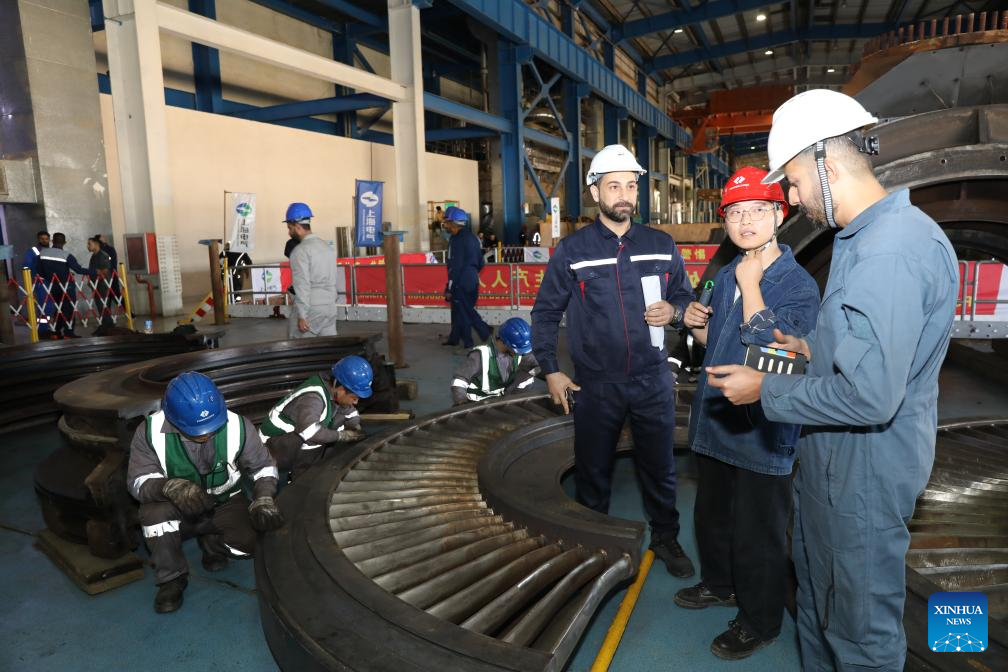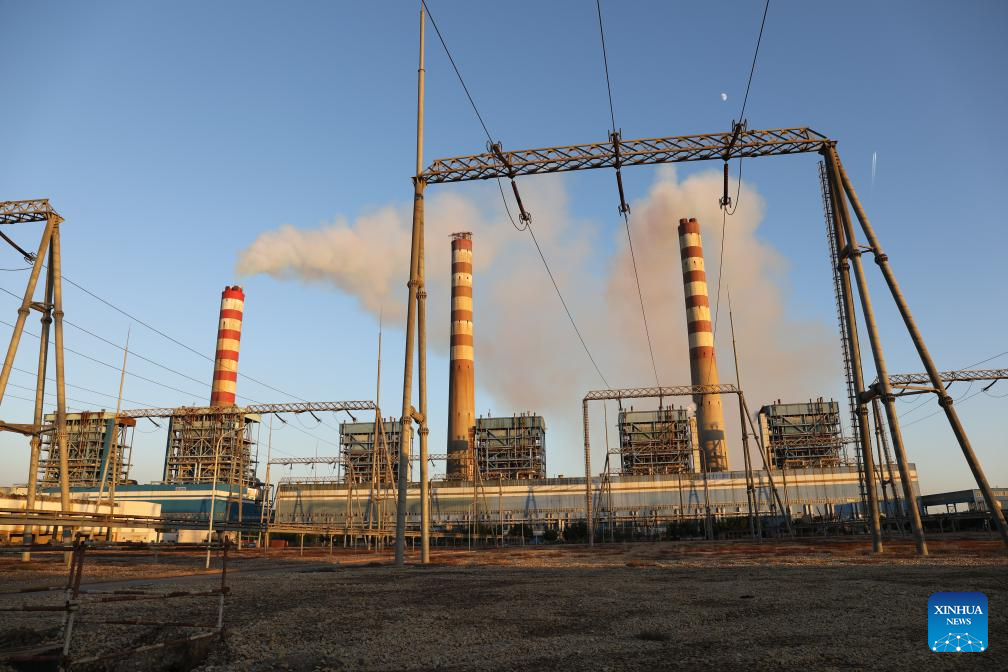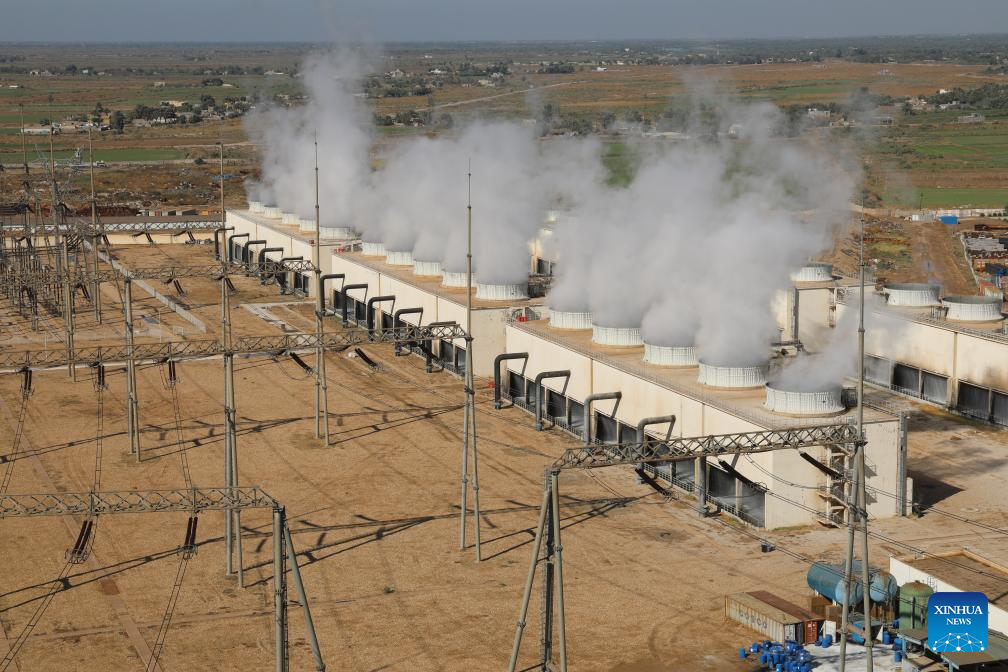
Staff members from China and Iraq work in the Wasit Power Plant, Iraq's largest thermal power plant, in Wasit Province, Iraq, Nov. 21, 2023. (Photo by Khalil Dawood/Xinhua)
by Xinhua writer Li Jun
BAGHDAD, Dec. 8 (Xinhua) -- Alongside the Tigris River in Wasit Province, Iraq's largest thermal power plant stands tall. With six generator units boasting a total installed capacity of 2,540 megawatts, it roars day and night, generating electricity for tens of thousands of families, bringing the light of hope to this war-torn country.
Years of continuous wars and conflicts have left Iraq, once a prosperous nation, in a state of disrepair. Among the myriad challenges faced by Iraq, power shortages have been a persistent woe, severely hindering its development.
In the scorching Iraqi summer, where temperatures can exceed 50 degrees Celsius, the demand for electricity soars, further aggravating power shortages and leaving citizens feeling very uncomfortable. The Wasit Power Plant, constructed and maintained by Shanghai Electric Group, has emerged as a beacon of hope.
As Iraq's largest thermal power plant, it has generated nearly 150 billion kilowatt-hours of electricity to date. At the peak of its power generation, it ensured 70 percent of the power supply in the capital Baghdad while providing the entire country with 30 percent of its power needs.
"When I was a young student, I only got dim lights while studying, because power outages were the norm. We only had electricity for about four hours per day," said Omar Raji, an engineer from Wasit Province who works at the plant.
Having worked at the plant for 12 years, Omar has witnessed the plant rising from the wilderness alongside the Tigris River. "Since the plant was built and began producing electricity, our situation changed dramatically, and power cuts in Wasit Province are a rare occurrence now," he said.
"Iraq has been facing a major problem in providing electricity to its citizens. The Wasit Power Plant has made a significant contribution to improving Iraq's power situation," said Mohammed Jassim, deputy director of the plant, who has just returned from a study and business tour in China.
The Chinese-built plant has also made great contributions to the economic and social development of Iraq.
The project has created nearly 3,000 jobs for locals, and trained a large number of Iraqi engineering construction and power technical talents, Lv Guoqing, executive manager of the plant, told Xinhua.
"I've benefited a lot and gained many mechanical engineering experiences and skills when working with Chinese colleagues," said Ali Youssef, a recent graduate from Baghdad University who joined the plant in August.
"They are easy to get along with ... and they help us by giving us information, and they are always generous in sharing their knowledge because they want us to continue the path they started," he added.
According to Lv, nearly 200 Iraqis have undergone technical training in Shanghai and over a thousand Iraqis have received operational and maintenance training from Chinese staff at the plant. This enables them to run and maintain the power station independently, now under the supervision and guidance of Shanghai Electric.
In 2014, the Islamic State (IS) militants captured Mosul, Iraq's second-largest city, and seized vast territories in Iraq's west and north. Mohammed recalled that many foreign companies left, while Chinese friends chose to stay with the plant to ensure Iraq's power supply.
In 2015, China and Iraq established a strategic partnership and signed cooperation agreements under the Belt and Road Initiative (BRI), injecting new vitality into China-Iraq relations. Today, China is Iraq's largest trading partner, and Iraq is China's third-largest trading partner among Arab countries.
"I believe Iraq will prosper under the BRI in terms of trade, industry, and infrastructure that were destroyed during the U.S. invasion of Iraq," Mohammed said. ■

Staff members from China and Iraq work in the Wasit Power Plant, Iraq's largest thermal power plant, in Wasit Province, Iraq, Nov. 21, 2023. (Photo by Khalil Dawood/Xinhua)

This photo taken on Nov. 21, 2023 shows the Wasit Power Plant, Iraq's largest thermal power plant, in Wasit Province, Iraq. (Photo by Khalil Dawood/Xinhua)

This photo taken on Nov. 21, 2023 shows electricity transmission wires in the Wasit Power Plant, Iraq's largest thermal power plant, in Wasit Province, Iraq. (Photo by Khalil Dawood/Xinhua)

Iraqi staff work in the Wasit Power Plant, Iraq's largest thermal power plant, in Wasit Province, Iraq, Nov. 21, 2023. (Photo by Khalil Dawood/Xinhua)

This photo taken on Nov. 21, 2023 shows the Wasit Power Plant, Iraq's largest thermal power plant, in Wasit Province, Iraq. (Photo by Khalil Dawood/Xinhua)

This photo taken on Nov. 21, 2023 shows the Wasit Power Plant, Iraq's largest thermal power plant, in Wasit Province, Iraq. (Photo by Khalil Dawood/Xinhua)

Chinese staff work at the Wasit Power Plant, Iraq's largest thermal power plant, in Wasit Province, Iraq, Nov. 21, 2023. (Photo by Khalil Dawood/Xinhua)



